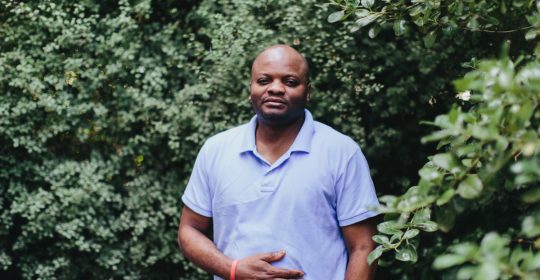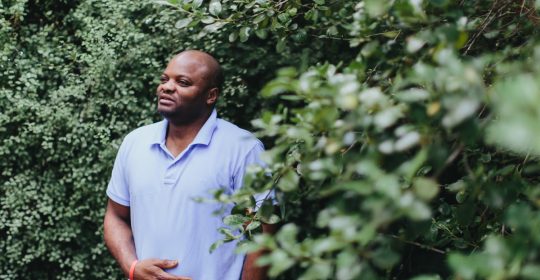
Trading home for safety.
Fourteen years after leaving his home country of Congo, Freddie is still rebuilding his life. In Congo, Freddie was a well-regarded, high-profile journalist, an occupation that saw him come under scrutiny from the government and forced him to leave his country. He reflects:
“In Congo, journalists are quite free, but it’s very risky. You write at your own risk. Meaning, they don’t control it, but anytime you do something that goes overboard they chop your fingers. I’ve got friends dead; I’ve got friends in prison.”
Fresh out of university, Freddie had a head full of dreams for change and was determined to bring them to life. It was a time of hope in Congo; a 32-year-old dictatorship had just ended and the country’s new rulers were promising change. The television network that employed Freddie was striving to report on topics depicting the daily life of the common people, far away from the dangerous political arena.
But soon they discovered that reporting on poorly-maintained road networks, the lack of sanitary infrastructure, rampant disease or food scarcity was not safe for a journalist under an autocratic regime—in fact it was seen as a critique of the central authority. The government would ultimately shut down the television station. Journalists were tracked down, and Freddie was forced to flee the country.
Arriving in South Africa, he secured a corporate visa, something he felt lucky to receive. The visa allowed him to work but it didn’t allow for long-term stability. The visa had to be renewed every two years, with no guarantee of renewal and the environment in South Africa was not easy for those seeking asylum.
Despite feeling his life was on shaky ground, Freddie set about a new career. Through hard work he rose to be supervisor at a call centre. But South Africa never felt like home and he missed Congo:
“African foreigners in South Africa are always there in a state of transit. I’m not here for good. You don’t stay here for good. You don’t make old bones here”
Impressed with his work ethic and skills, Freddie was chosen to go to Fiji to help set up a new office, and so he went. But only a month into his time in Fiji, Freddie fell seriously ill. So ill that if he didn’t have surgery within hours he may not survive. His employment contract included health insurance and while Freddie was in a coma, they organised for him to be flown to the Gold Coast to have life-saving surgery. Waking up in Australia a week later was surreal for Freddie:
“When I woke up they brought this big old whiteboard, and the doctor was explaining to me, ‘This is where you were, this is where you are.’ This is how I arrived in Australia.”
During his recovery, he was dropped from employer. Stranded, Freddie’s corporate visa was immediately redundant. Left with no other option, he sought asylum in Australia.
“I didn’t have a job anymore, I didn’t have a visa anymore, I couldn’t go back to Cape Town and here I was. I couldn’t go back to my country because I was a journalist in my country. That was the reason why I left it and went to South Africa, because of the things I was writing about—the president, his life—so I couldn’t go back to Congo, and, well, I was stranded here.”
This was the turning point for Freddie in Australia. A pastor introduced him to the Asylum Seeker Resource Centre (ASRC), an independent not for profit that supports around 3,200 people seeking refuge in Victoria each year. He was quickly assisted through the refugee determination process with the help of a legal team, and legal representation. The ASRC set about helping him to once again start the process of building his life again.
Thanks to the diligent, hard work from the ASRC legal team, Freddie received his permanent residency in 2012, something that Freddie knows doesn’t happen to all those who seek protection in Australia: “I’m damn lucky. When you arrive in Australia, as soon as you’ve got your permanent residency, you know that your life is settled.”
Determined to make the most of the opportunity, Freddie is starting a new career again, studying nursing. To be able to do this, he is working night shifts: “You tell yourself it’s just a phase, one stage,” he says. “Like when you’re learning something new, it’s always tough at the beginning and then you kind of ‘click,’ and everything opens up, like a lifted veil. I’m just hoping that one day, when I have everything settled. Right now it’s a fight, it’s a struggle.”
With only a year left to finish his nursing studies, Freddie knows the phase will soon be over and he has plans to give back to those who helped him start over again in Australia, especially the ASRC: “I have to come back here one day to repay. For me I feel like I’ve got a debt. I have to repay my debt here, I have to come back.”
Right now there are 24,500 people seeking asylum whose chance of being recognised as a refugee grows slimmer because of a ruthless and unjust refugee determination process. The government’s $28 million cut to funding in the sector has meant the demand for independent not for profits like the ASRC have seen a five-fold increase in people seeking asylum who need critical, urgent legal support to lodge their claim for protection. Without access to timely and free legal assistance, thousands of refugees might be sent back to danger.
If you feel more people like Freddie deserve to live in safety, please donate to the ASRC’s winter appeal. A gift of $200 can provide emergency legal advice to 10 people seeking asylum. Go to asrc.org.au/winterappeal
Photograph by Kim Cartmell
Leave a reply



Connect with us
Need help from the ASRC? Call 03 9326 6066 or visit us: Mon-Tue-Thur-Fri 10am -5pm. Closed on Wednesdays.